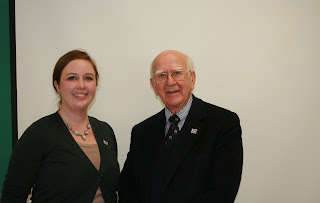 |
| Prof. Nelson and Worcester |
Early in his career, he said, “everything was fitting into
place because of KU.”
Worcester also shared some advice with the crowd of students
and faculty mentioning his fondness for a “grasshopper mind,” a mind that can
balance many projects at one time and jump between them when needed. But, when
a student raised his hand and asked if there was one specific thing Worcester
could tell young business students, his answer was simple.
“Take a risk. If you think something should be done, do it,”
Worcester said. “Then if somebody says you weren’t supposed to do it, tell them
you didn’t know you weren’t supposed to do it. Just take a risk.”
Worcester is the chancellor of the University of Kent and
the chairman of the Magna Carta 800th Committee, celebrating the
documents 800th anniversary. He is also the founder of Market &
Opinion Research International (MORI). Worcester is originally from Kansas City
and is a Korean War veteran.
